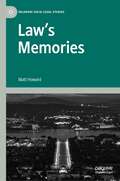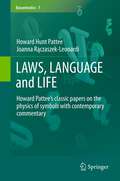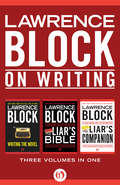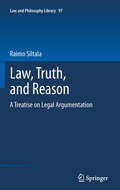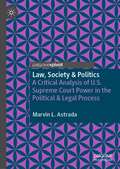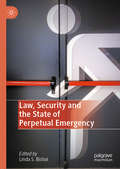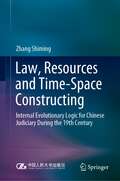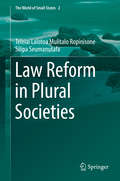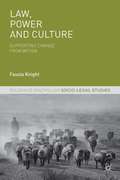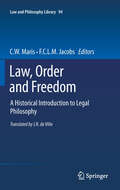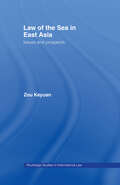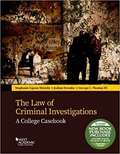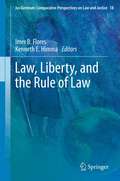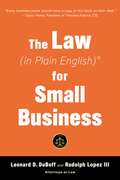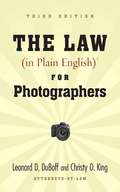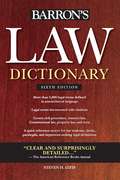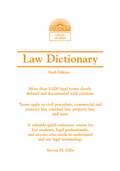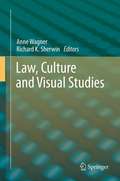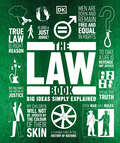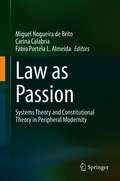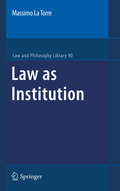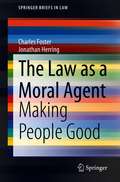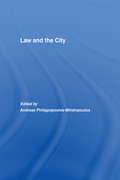- Table View
- List View
Law’s Memories (Palgrave Socio-Legal Studies)
by Matt HowardThis book discusses the relationship between law and memory and explores the ways in which memory can be thought of as contributing to legal socialization and legal meaning-making. Against a backdrop of critical legal pluralism which examines the distributedness of law(s), this book introduces the notion of mnemonic legality. It emphasises memory as a resource of law rather than an object of law, on the basis of how it substantiates senses of belonging and comes to frame inclusions and exclusions from a national community on the basis of linear-trajectory and growth narratives of nationhood. Overall, it explores the sensorial and affective foundations of law, implicating memory and perceptions of belonging within this process of creating legality and legitimacy. By identifying how memory comes to shape and inform notions of law, it contributes to legal consciousness research and to important questions informing much socio-legal research.
LAWS, LANGUAGE and LIFE
by Howard Hunt Pattee Joanna Rączaszek-LeonardiHoward Pattee is a physicist who for many years has taken his own path in studying the physics of symbols, which is now a foundation for biosemiotics. By extending von Neumann's logical requirements for self-replication, to the physical requirements of symbolic instruction at the molecular level, he concludes that a form of quantum measurement is necessary for life. He explains why all non-dynamic symbolic and informational controls act as special (allosteric) constraints on dynamical systems. Pattee also points out that symbols do not exist in isolation but in coordinated symbol systems we call languages. Such insights turn out to be necessary to situate biosemiotics as an objective scientific endeavor. By proposing a way to relate quiescent symbolic constraints to dynamics, Pattee's work builds a bridge between physical, biological, and psychological models that are based on dynamical systems theory. Pattee's work awakes new interest in cognitive scientists, where his recognition of the necessary separation--the epistemic cut--between the subject and object provides a basis for a complementary third way of relating the purely symbolic, computational models of cognition and the purely dynamic, non-representational models. This selection of Pattee's papers also addresses several other fields, including hierarchy theory, artificial life, self-organization, complexity theory, and the complementary epistemologies of the physical and biological sciences.
Lawrence Block on Writing: Three Volumes in One
by Lawrence BlockA special three-in-one edition of four-time Edgar Award winner Lawrence Block's definitive collections on the art of writing fiction: Writing the Novel, The Liar's Bible, and The Liar's CompanionIn Writing the Novel, Lawrence Block, the crown prince of suspense writing,offers neither tricks nor formulas, but straightforward advice based on the experience that comes with publishing more than one hundred books. He explains how to refine an idea, how to study one's chosen genre, and how to use the novel's expansive form to find one's particular voice. And he tells it all in the easy, immediate style that has made his own work so successful. The Liar's Bible collects, for the first time, ten years' worth of Block's writing expertise as originally published in his monthly column for Writer's Digest. Each essay illuminates the tricks of the authorial trade, from creating vibrant characters and generating seamless plots, to conquering writer's block and experimenting with self-publishing. Filled with wit and insight, this is a must-read for experts, amateurs, and anyone interested in learning to craft great fiction from one of the field's modern masters.And in The Liar's Companion, more of Lawrence Block's hard-won wisdom from his monthly column in Writer's Digest is brought together in one enlightening collection, covering such topics as creating a fresh story, delivering a powerful ending, adapting books for the screen, and deciding when to make the switch to full-time writer.
Law, Truth, and Reason
by Raimo SiltalaThis book is an innovative contribution to analytical jurisprudence. It is mainly based on the distinct premises of linguistic philosophy and Carnapian semantics, but also addresses the issues of institutional philosophy, social pragmatism, and legal principles as envisioned by Dworkin, among others. Wróblewski´s three ideologies (bound/free/legal and rational) and Makkonen´s three situations (isomorphic/semantically vague/normative gap) of judicial decision-making are further developed by means of 10 frames of legal analysis as discerned by the author. With the philosophical theories of truth serving as a reference, the frames of legal analysis include the isomorphic theory of law (Wittgenstein, Makkonen), the coherence theory of law (Alexy, Peczenik, Dworkin), the new rhetoric and legal argumentation theory (Perelman, Aarnio), social consequentialism (Posner), natural law theory (Fuller, Finnis), and the sequential model of legal reasoning by Neil MacCormick and the Bielefelder Kreis. At the end, some key issues of legal metaphysics are addressed, like the notion of legal systematics and the future potential of the analytical approach in jurisprudence.
Law, Society & Politics: A Critical Analysis of U.S. Supreme Court Power in the Political & Legal Process
by Marvin L. AstradaThis book explores critical questions pertaining to the character and content of the “American People” as posited in the US Supreme Court’s interpretation of the fundamental law. What exactly is an American? Who or what comprise the People? What are the constitutive sociocultural, political, and economic ordering principles of the American People and society? How does the Court impact the nationalist character and content of law and policy? From a sociocultural, economic, political, and ideological perspective, the Court’s singular proclamations as to what the US Constitution means, what is its purpose, and how it is to be perceived and implemented have profound consequences for representational politics and notions of what exactly constitutes the American polity. This book employs a critical, conceptual, and structural approach, critically examining the notion of the People in constitutional discourse, and its impact on government, politics, law, and society in the present.
Law, Security and the State of Perpetual Emergency
by Linda S. BishaiPresenting diverse contributors from legal, academic, and practitioner sectors, this book illustrates how the distinctions between international and domestic law are falling away in the context of security, particularly in the responses to terrorism, and explores the implications of these dramatic shifts in the normative order. Fundamental changes in the powers of the state and the rights of populations have accelerated since the globalized response to 9/11, creating effects that spread beyond borders and operate in a new, as yet under-conceptualized space. Although these altered practices were said to be in response to exceptional circumstances — a response to terrorism — they have become increasingly established in an altered baseline norm. This book explores the (inter)national implications of exceptional legal efforts to protect states’ domestic space in the realm of security.
Law, Resources and Time-Space Constructing: Internal Evolutionary Logic for Chinese Judiciary During the 19th Century
by Zhang ShimingThis book studies the judicial evolution of the Qing Dynasty. It sums up the changes from six major aspects: 1. Banfang(班房)emerged in the late Qianlong period; 2. The opening of capital appeals(京控)early in Jiaqing’s reign; 3. The consular jurisdiction was established during Daoguang’s reign; 4. The execution on the spot (就地正法)was started in Daoguang and Xianfeng periods; 5. The introduction of fashenju (发审局,a interrogatory court) happened during Tongzhi’s reign; 6. Late in Guangxu’s reign, banishment was abolished, and reforms were made for prisons. In the past, people did not have a comprehensive understanding of these big changes. From the perspective of legal culture, scholars often criticize traditional Chinese law focuses on criminal law while ignores civil law in terms of legal culture, but this situation can be explained in part by the inadequate allocation of resources and authoritarian resources in traditional societies. Using a large number of archives and precious materials such as private notes that were not noticed by academics in the past, this book adopts the research path of new historical jurisprudence to explore the inner logic of judicial evolution in the Qing Dynasty, focusing on the triangular connection between legal rules, resources, and temporal and spatial constructions, which is an important contribution to the study of traditional Chinese law.
Law Reform in Plural Societies
by Teleiai Lalotoa Mulitalo Ropinisone Silipa SeumanutafaThis book asserts that the Pacific Islands continue to struggle with the colonial legacy of plural legal systems, comprising laws and legal institutions from both the common law and the customary legal system. It also investigates the extent to which customary principles and values are accommodated in legislation. Focusing on Samoa, the author argues that South Pacific countries continue to adopt a Western approach to law reform without considering legal pluralism, which often results in laws which are unsuitable and irrelevant to Samoa. In the context of this system of law making, effective law reform in Samoa can only be achieved where the law reform process recognises the legitimacy of the two primary legal systems. The book goes on to present a law reform process that is more relevant and suitable for law making in the Pacific Islands or any post-colonial societies.
Law, Power and Culture: Supporting Change From Within (Palgrave Socio-Legal Studies)
by F. KnightA fresh theory on how individuals respond to inequalities occurring within their own communities. This original and insightful study draws on empirical research on the Santal people of Asia, examining power relations within social fields, and the state, to reveal a typology of power practices, and applies these to forced marriage in the West.
Law, Order and Freedom
by J.R. de Ville C. W. Maris F.C.L.M. JacobsThe central question in legal philosophy is the relationship between law and morality. The legal systems of many countries around the world have been influenced by the principles of the Enlightenment: freedom, equality and fraternity. The position is similar in relation to the accompanying state ideal of the democratic constitutional state as well as the notion of a welfare state. The foundation of these principles lies in the ideal of individual autonomy. The law must in this view guarantee a social order which secures the equal freedom of all. This freedom is moreover fundamental because in modern pluralistic societies a great diversity of views exist concerning the appropriate way of life. This freedom ideal is however also strongly contested. In Law, Order and Freedom, a historical overview is given pertaining to the question of the extent to which the modern Enlightenment values can serve as the universal foundation of law and society.
Law of the Sea in East Asia: Issues and Prospects (Routledge Studies in International Law #5)
by Keyuan ZouLaw of the Sea in East Asia selects the most prominent maritime legal issues that have emerged since the post-LOS Convention era for a detailed discussion and assessment. The current marine legal order in East Asia is based on the 1982 United Nations Convention on the Law of the Sea (LOS Convention) and accordingly coastal states in the region are obliged to cooperate amongst themselves to exercise their rights and perform their duties. Keyuan, a respected expert in the fields of international and Chinese law, explores issues concerning compliance with the law of the sea, territorial disputes and maritime boundary delimitation, fishery management, safety of navigation and maritime security, and neglected issues in the law of the sea. This is the first book to examine maritime laws in East Asia, and as such will appeal to academics of law and Asian studies, lawyers and policy makers.
The Law of Reputation and Brands in the Asia Pacific
by Andrew T. Kenyon Ng-Loy Wee Loon Megan Richardson Andrew T. Kenyon Ng-Loy Wee LoonEfforts to expand the scope of legal protection given to reputation and brands in the Asia Pacific region have led to considerable controversy. Written by a variety of experts, the essays in this book consider the developing law of reputation and brands in a fraught area.
The Law Of Criminal Investigations: A College Casebook (Higher Education Coursebook)
by Stephanie Mizrahi Joshua Dressler George Thomas IIIThis newly designed casebook provides the perfect balance between the challenges of the case method and the needs of undergraduate and graduate students who may, or may not, be headed to law school. The Law of Criminal Investigations: A College Casebook makes use of many of your favorite U.S. Supreme Court cases; edited to reflect the needs of undergraduate students, with Notes and Questions that help illuminate the case and show how it works in the real world. Also included are narratives and summaries that explain and synthesize some of the more complicated legal nuances found in the world of criminal procedure. Written by renowned law professors and authors, Joshua Dressler and George Thomas, who are now joined by Dr. Stephanie Lipson Mizrahi, this book will appeal to all criminal procedure teachers who want to offer their students more in-depth coverage and analysis of this important topic.
Law of Asylum in the United States (2013 Edition)
by Deborah E. AnkerLaw of Asylum in the United States is a classic and comprehensive presentation of U.S. asylum law. It describes and interprets applicable U.S. laws, as well as numerous international sources, and provides detailed discussions of all aspects of asylum and refugee law, including: The meaning of well-founded fear and persecution; The five grounds (race, religion, nationality, social group membership, and political opinion); Withholding of removal protection and protection under the Convention Against Torture; Claims based on childhood status and gender-based persecution; When non-state actors can be considered agents of persecution; Asylum eligibility for those fleeing gang violence in their home countries; Elements of proof; Credibility determinations and Recent changes in statutory language enacted with the REAL ID Act.
Law, Liberty, and the Rule of Law
by Imer B. Flores Kenneth E. HimmaIn recent years, there has been a substantial increase in concern for the rule of law. Not only have there been a multitude of articles and books on the essence, nature, scope and limitation of the law, but citizens, elected officials, law enforcement officers and the judiciary have all been actively engaged in this debate. Thus, the concept of the rule of law is as multifaceted and contested as it's ever been, and this book explores the essence of that concept, including its core principles, its rules, and the necessity of defining, or even redefining, the basic concept. Law, Liberty, and the Rule of Law offers timely and unique insights on numerous themes relevant to the rule of law. It discusses in detail the proper scope and limitations of adjudication and legislation, including the challenges not only of limiting legislative and executive power via judicial review but also of restraining active judicial lawmaking while simultaneously guaranteeing an independent judiciary interested in maintaining a balance of power. It also addresses the relationship not only between the rule of law, human rights and separation of powers but also the rule of law, constitutionalism and democracy.
The Law (in Plain English) for Small Business (Sixth Edition)
by Leonard D. DuBoff Rudolph Lopez III&“Well written and logically organized.&” —Booklist. This handbook makes planning and problem-solving easy with its clear explanations of complex issues. In The Law (in Plain English)® for Small Business, Sixth Edition, Leonard DuBoff guides entrepreneurs and small business owners through the maze of legal obligations and protections they need to understand. Chapters cover important topics such as: LicensesTrademarksInsurance plansFranchisingIncorporatingAdvertisingeBusiness considerationsTaxesSuccession planning Whether one is just about to open a small business, reassessing an existing business, or simply have a few questions, The Law (in Plain English)® for Small Business, Sixth Edition, is the go-to resource for small business owners and entrepreneurs.
The Law (in Plain English) for Photographers
by Leonard D. DuboffThe revisions for this third edition cover key digital issues, such as the Copyright Office's new online registration process; post-9/11 rules for shooting in "sensitive" environments; and updates to right of privacy laws. Not only can this book save thousands in attorney's fees, it also explains how to find good legal assistance when necessary. Readers will find information on:--censorship and obscenity--the rights of privacy and publicity--organizing as a business--tax deductions for the home office--relevant court cases--photography organizations--releases, contracts, and other forms
Law Dictionary, (Trade) 6th Ed: Mass Market Edition
by Steven H. GifisA Simon & Schuster eBook. Simon & Schuster has a great book for every reader.
Law Dictionary, (Mass Market) 6th Ed.: Mass Market Edition
by Steven H. GifisA Simon & Schuster eBook. Simon & Schuster has a great book for every reader.
Law, Culture and Visual Studies
by Anne Wagner Richard K. SherwinThe proposed volumes are aimed at a multidisciplinary audience and seek to fill the gap between law, semiotics and visuality providing a comprehensive theoretical and analytical overview of legal visual semiotics. They seek to promote an interdisciplinary debate from law, semiotics and visuality bringing together the cumulative research traditions of these related areas as a prelude to identifying fertile avenues for research going forward. Advance Praise for Law, Culture and Visual Studies This diverse and exhilarating collection of essays explores the many facets both historical and contemporary of visual culture in the law. It opens a window onto the substantive, jurisdictional, disciplinary and methodological diversity of current research. It is a cornucopia of materials that will enliven legal studies for those new to the field as well as for established scholars. It is a 'must read' that will leave you wondering about the validity of the long held obsession that reduces the law and legal studies to little more than a preoccupation with the word. Leslie J Moran Professor of Law, Birkbeck College, University of London Law, Culture & Visual Studies is a treasure trove of insights on the entwined roles of legality and visuality. From multiple interdisciplinary perspectives by scholars from around the world, these pieces reflect the fullness and complexities of our visual encounters with law and culture. From pictures to places to postage stamps, from forensics to film to folklore, this anthology is an exciting journey through the fertile field of law and visual culture as well as a testament that the field has come of age. Naomi Mezey, Professor of Law, Georgetown University Law Center, Washington, D.C., USA This highly interdisciplinary reference work brings together diverse fields including cultural studies, communication theory, rhetoric, law and film studies, legal and social history, visual and legal theory, in order to document the various historical, cultural, representational and theoretical links that bind together law and the visual. This book offers a breath-taking range of resources from both well-established and newer scholars who together cover the field of law's representation in, interrogation of, and dialogue with forms of visual rhetoric, practice, and discourse. Taken together this scholarship presents state of the art research into an important and developing dimension of contemporary legal and cultural inquiry. Above all, Law Culture and Visual Studies lays the groundwork for rethinking the nature of law in our densely visual culture: How are legal meanings produced, encoded, distributed, and decoded? What critical and hermeneutic skills, new or old, familiar or unfamiliar, will be needed? Topical, diverse, and enlivening, Law Culture and Visual Studies is a vital research tool and an urgent invitation to further critical thinking in the areas so well laid out in this collection. Desmond Manderson, Future Fellow, ANU College of Law / Research School of Humanities & the Arts, Australian National University, Australia
The Law Book (DK Big Ideas)
by DKLearn about the most important legal milestones in history in The Law Book.Part of the fascinating Big Ideas series, this book tackles tricky topics and themes in a simple and easy to follow format. Learn about Law in this overview guide to the subject, great for novices looking to find out more and experts wishing to refresh their knowledge alike! The Law Book brings a fresh and vibrant take on the topic through eye-catching graphics and diagrams to immerse yourself in. This captivating book will broaden your understanding of Law, with:- More than 90 ground-breaking legal milestones- Packed with facts, charts, timelines and graphs to help explain core concepts- A visual approach to big subjects with striking illustrations and graphics throughout- Easy to follow text makes topics accessible for people at any level of understandingThe Law Book is a captivating introduction to the legal precedents, and religious, political, and moral codes that have shaped the world we live in, aimed at adults with an interest in the subject and students wanting to gain more of an overview. Discover the most important milestones in legal history, from the Code of Hammurabi to groundbreaking legislation including Magna Carta and the Abolition of the Slave Trade Act, all through exciting text and bold graphics.Your Law Questions, Simply ExplainedThis engaging overview goes into legal history across the world, all the way into the 21st century, with copyright in the digital age, same-sex marriage, and the &“right to be forgotten&”. If you thought it was difficult to learn about legislations and legal history, The Law Book presents key information in an easy to follow layout. Learn about the most important breakthroughs, like the fight for universal suffrage and workers&’ rights, and the establishment of international legal bodies like INTERPOL and the European Court of Justice.The Big Ideas SeriesWith millions of copies sold worldwide, The Law Book is part of the award-winning Big Ideas series from DK. The series uses striking graphics along with engaging writing, making big topics easy to understand.
Law as Passion: Systems Theory and Constitutional Theory in Peripheral Modernity
by Miguel Nogueira de Brito Carina Calabria Fábio Portela L. AlmeidaInspired by the works of Professor Marcelo Neves, in this book colleagues come together to explore how their research has been influenced by non-European and post-colonial approaches. With a foreword by Karl-Heinz Ladeur, it features essays written by leading scholars in the fields of sociology of law and constitutional theory – including Hauke Brunkhorst, Darío Rodrígues, Kimmo Nuotio and Pablo Holmes.The content is divided into four sections, the first of which, “Law, State, and Global Crisis,” covers topics related to the modern constitutional state, the crisis of global capitalism, and the global rule of law. The second, “Symbolic Constitutionalization,” analyzes challenges to constitutionalism in the “Peripheral Modernity.” The authors in the third section examine how the concept of “Transconstitutionalism” can shed new light on contemporary debates concerning global public law. In turn, the last section of the book, “Systems Theory and Public Law,” addresses systems theory issues in the fields of legal history and administrative law.The book presents a relevant and original discussion encompassing such diverse fields as constitutional theory, international law, systems theory, and sociology of constitutions.
Law as Institution
by Massimo La TorreThe book's argument moves from discussing the relation between law and power. Theories defending the primacy of law over power are played against doctrines which center around the prevailing role of law. Legal positivism and natural law are here the real issue at stake. Constitutionalism and the rule of law are then seen as a development of the modern natural law tradition. But the book's main move is a consideration of law as a phenomenon possibly connected with language. Once traditional imperativist strategies are seen as unsatisfactory, and nevertheless law is accepted as being a social fact, there is the possibility of addressing such fact as somehow analogically linked with a system of language. In a sense, language is thought of as fundamental or primordial ontological dimension, so that this can offer the key to address and understand the question of what reality is. The question of meaning overlaps that of being, not only as far as the being of the world is concerned but also with respect to the nature of law. The concept of law -could not be approached without addressing the issue of law as a language. To this purpose "use theory" is assessed and taken as a possible candidate to build up a sensible theory of legal validity. From this angle institutionalism is then seen to be the most fruitful approach to conceptualize the ontology of law, though some reform in the standard theory and in its more recent developments is proposed to render more plausible the notion of "institution". Finally, the strong normative side of a (legal) institution is studied. The relation of law and morality is assessed by pointing out the difference between the "constitutive" character of law and the "regulative" core of morality. However, an institution is both an "is" and an "ought", while law is at the same time "facticity" and "normativity.
The Law as a Moral Agent: Making People Good (SpringerBriefs in Law)
by Charles Foster Jonathan HerringThis book examines the controversial and repercussive contention that an objective of the law should be to promote personal morality - to make people ethically better. It surveys a number of domains, including criminal law, tort law, contract law, family law, and medical law (particularly the realm of moral enhancement technologies) asking for each: (a) Does the existing law seek to promote personal morality? (b) If so, what is the account of morality promoted, and what is the substantive content? (c) Does it work? and (d) Is this a legitimate objective?
Law and the City: Theorising Environmental Law And The City (Law, Science And Society Ser.)
by Andreas Philippopoulos-MihalopoulosLaw and the City offers a lateral, critical and often unexpected description of some of the most important cities in the world, including Moscow, Istanbul, Berlin, Singapore, Athens, Mexico City, Toronto, Sydney, Johannesburg: each one from a distinctive legal perspective. An invaluable 'guide' to adopting a different approach to the city and its history, culture and everyday experience, Law and the City is not simply an exploration of the relationship between these two spheres. It details: a flourishing of law’s spatiality and urban legal locality an unfolding of both the juridical urban body and the city’s legal dreams, of both the ‘urban law’ and the ‘juridical polis’. Enlightening and at the same time problematizing the reader, this volume is an innovative collection of truly global dimensions that will prove compelling reading both for specialists and for critical travellers.
